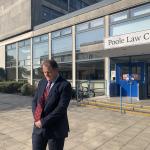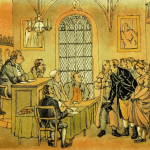John Fea is a friend of mine and professor of history at Messiah College. John has an excellent new book coming out asking if America was founded as a Christian nation, a book that I heartily recommend. Recently I got a note from a pastor who asked for advice about the rise of the “Black Robe Brigade.” This topic is outside my expertise and so I approached John to see if he would post on this for us … which he has. This is a serious issue. John brings a wealth of knowledge to this issue. Enjoy.
Have you heard about the Black Robe Brigade? What are you hearing? Do you see this as an issue in the churches?
During Glenn Beck’s August 28 rally at the Lincoln Memorial he introduced a group of 240 pastors, priests, rabbis, and imams that he calls the “Black Robe Brigade.” (Despite the promotion of this group as ecumenical, I think most of them were Protestant evangelicals). The group is named after the so-called “Black Regiment,” a term employed by eighteenth-century Tories and Anglicans to describe dissenting clergy who supported the American Revolution and took part in the rebellion against England. Peter Oliver, one of the first Tory historians of the American Revolution, devoted several pages to the Black Regiment in his 1781 work The Origin & Progress of the American Rebellion.
Beck got the idea for the “Black Robe Brigade” from David Barton, a political activist who has become very effective at a practice that might be called “political indoctrination by historical example.” Beck has received help in mobilizing his brigade from an all-star cast of evangelical leaders that includes James Dobson, John Hagee, Richard Land, Jerry Falwell Jr., and James Robison. Beck wants all pastors who care about their country to join him in the fight to reclaim the religious and moral roots of the United States.
When I first heard about Beck’s “Black Robe Brigade” I knew it would only be a matter of time before local pastors would be faced with pressure to join the cause. Recently, Scot McKnight, the author of the popular blog Jesus Creed, informed me of a pastor in need of wisdom on how to handle such pressure. Here is a snippet of that pastor’s letter to Scot:
I pastor a church in a small rural community and this morning I met with a couple from another congregation, at their request, that are organizing a “Christian Heritage Rally” to re-educate local Christians on our civic duties and making sure God is a part of all of our lives. I can support both of those when clarified and defined but much of this movement (at least in my local experience) has swallowed hook, line, and sinker that America is a chosen nation of God and was founded on Christian principles and so the flag and the cross march in lock-step (at least when conservative leaders are calling the shots).
Here’s a brief overview of what they’re planning locally. They’re opening with the “Genesis of America” DVD (trailer here: http://genesisofamerica.com/trailer), then singing “America,” saying the Christian pledge and the American pledge, and then want pastors to lead the group in the Lord’s Prayer. All the speakers are from out of town, they want to take up a collection, share about the American Defense Fund and legislative issues, and then close with “Onward Christian Soldiers.” There is a lot in there that grieves my heart as a follower of Jesus, Anabaptist leanings notwithstanding. I can’t support revisionist (or selective) history and I’m very concerned about civil religion and nationalism.
With everything else related to the Tea Party we’ve been able to sidestep the issue and quietly raise questions that challenge our parishioners. This time they’re actively recruiting pastoral involvement and I’m seeking advice on how to respond to what will be political at least as much as it is “religious.” It seems to me that they’ve already decided this is the right course of action and are now drawing a line in the sand to force local pastors to be for or against it without having any input into the development of this rally.
Our local ministerial association will be discussing our involvement and these folks want pastors at the front of this thing. At this point, I cannot be a part of this in good faith because of what they’ve expressed to me regarding it. How do I respectfully do that without breaking peace with brothers and sisters in Christ while also not neglecting my calling as a shepherd wanting to guard the flock (in our community, not just my congregation) against something that I think is very dangerous to their discipleship as followers of Jesus.
It seems to me that the more traction this Glenn Beck “Black Robe” movement gets, the more concerned Christians–especially historians who care deeply about the Church–need to step up to the plate out of a sense of vocation. This is a time when good historical thinking must come to the aid of the Church. We need to be educated on these matters. I tried to make a small effort at doing this by writing Was America Founded as a Christian Nation: A Historical Introduction, but I wonder if a book has the potential to change the minds of ordinary evangelicals who do not want to hear anything about American history that they can’t use to advance their political and cultural agenda. A few weeks ago a visiting preacher at my evangelical church said something in passing that criticized Glenn Beck and he got so many negative e-mails that he had to address the issue the following Sunday.
How might we begin educating churchgoers about how to use history responsibly? Let me begin by saying a few words about the kind of history being promoted at the “Christian Heritage Rally” that this local pastor describes.
I just watched the trailer of the “Genesis of America” documentary. I would encourage you to take a few minutes and watch it as well. A lot of things that these talking heads say on the video is true. Did the Founders see religion as important for creating a virtuous republic? Of course they did. I think this is something that Christians today should celebrate. Is the idea of “providence” incompatible with pure eighteenth-century deism? Yes. Indeed, as I argue in my forthcoming book, few of the founders were deists. Is the phrase “separation of church and state” in the Constitution? No.
Did Woodrow Wilson say that America was founded as a Christian nation? Yes, he did. That is a historical question that is easily answerable. Indeed, Wilson believed that God held a special place for the United States. But was he right? That is a completely different question–a theological one.
Did most, if not all, of the founders believe in some form of divine providence? Yes. Again, that is a historical question that is easily answerable. But were the founders right–from a Biblical and theological perspective rooted in Christian orthodoxy– when they said that God had a special, unique, and exceptional purpose for America? Again, this seems to be a theological question. (It also seems to be a question that is impossible to answer if you have a high view of the mystery of God).
The Christians associated with these kinds of documentaries blur the historical and the theological. If Washington mentioned God, they argue, then America must have been founded as a Christian nation. There is no attempt to offer theological reflection or critique on the views of the founders because they have been presented as being above reproach. Many of the defenders of “Christian America” believe that the founders have been specially appointed to do the work of God.
There is a lot of misinformation out there. Not everything Barton, or Peter Marshall, or the Genesis of America people say is wrong, but it is twisted and presented in such a way that does not account for the complexity and fullness of the past. Historians concerned with the integrity of the past and the integrity of their work must also note that John Adams rejected the doctrine of the Trinity. They should mention that George Washington deliberately avoided taking communion. They must also tell the whole truth about the so-called “Black Regiment.” Most of these clergymen were blatantly anti-Catholic. Others blurred Biblical teachings on freedom (from sin) with political teachings on freedom (from George III). These Christian America pundits tell just one side of the story because the so-called “rest of the story” does not suit their political needs in the present. This is what I mean by indoctrination by historian example. This is history at its worst!
I realize that all of this will not help Scot McKnight’s pastor friend. It sounds like the people he is dealing with have already made up their minds. I am afraid that we are going to see more and more of this kind of divisiveness in local churches and communities.
As this post makes clear, I am a historian, not a theologican or religious counselor. But I would probably advise this pastor to work toward reconciliation and explain his opposition to this Christian Heritage Rally in clear, biblical language that the pro-Beck evangelicals can understand and respect. Many tea party Christians who I have met would be shocked to learn that their might be an alternative Christian way of thinking about these issues.















